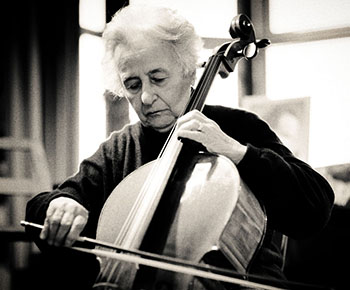
Anita Lasker Wallfisch
Many survivors of Auschwitz talk about hearing music when they first arrived at the camp or while they were marching to work each morning. One of the musicians they heard may very well have been Anita Lasker Wallfisch.
Anita was born to a lawyer father and violinist mother in Breslau, Germany (now Poland), and had two sisters. She was exposed to music and culture from a young age; the family spoke French every Sunday, played chamber music, and read classic literature. Anita played the cello, but when she was 12, she had to go to Berlin to continue studying because there were no teachers left in Breslau willing to teach a Jewish student. She returned home after Kristallnacht, and she and her sisters were no longer allowed to go to school. Instead, they were conscripted to work in a paper factory, and the family moved into an overcrowded flat.
On April 9, 1942, Anita’s parents were deported to Isbiza, near Lublin, where they were murdered after being forced to dig their own graves. Anita was 16 years old. She began engaging in clandestine activities at the paper factory, such as forging papers and procuring civilian clothes for French prisoners of war to escape. Eventually she was discovered and arrested when she tried to escape to France.
Ironically, being arrested actually saved her life, Anita says. She spent over a year in prison before being sent to Auschwitz, and when she finally arrived there, she did not have to go through selection because convicted criminals were not gassed immediately. Her cello playing protected her again when she was conscripted into the Auschwitz camp orchestra, made up of prisoners who played every morning and night while the other prisoners marched to and from work. Their conductor was a niece of composer Gustav Mahler who demanded perfection; only later did Anita realize that her severity was a blessing in disguise. It enabled the musicians to forget what was happening around them and focus only on the music.
As the Russian army advanced, Anita was sent to Bergen-Belsen. Here, there was no orchestra, no gas chamber, and no food or water. Prisoners were simply left to die. Anita managed to survive until the camp was liberated on April 15, 1945.
Nearly a year later, Anita went to England, where she became a professional cellist and married Peter Wallfisch in 1952. Her son and two grandsons are also musicians. Though she rarely plays anymore, Anita agreed to play the cello on the soundtrack of the documentary Auschwitz, composed by her grandson Benjamin Wallfisch, in honor of the 70th anniversary of the liberation of Auschwitz this past January.
Photo by Benjamin Ealovega